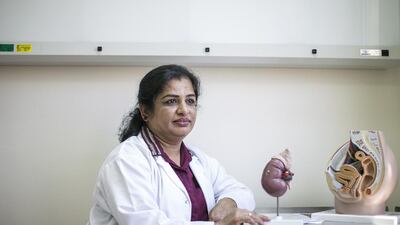ABU DHABI // Members of the public began offering to donate organs in the event of their death, handing a lifeline to patients in need ahead of the launch next month of the country’s first donor programme.
Hospitals said residents had contacted staff to volunteer after a change in the law last year that paved the way from transplants from deceased donors.
Until recently, only live operations were legal, meaning only family members were likely donors, and only kidneys would be available.
“We’ve had people calling us, saying that in case of their death they would like to donate their organs to anyone and have asked us how to register,” said Anan Purushothaman, a medic and specially trained “transplant champion” at Seha’s Sheikh Khalifa Medical City. She said there had been 10 such requests at her hospital alone since March.
The unprompted interest has given doctors hope that the drive will generate even more interest. Most countries struggle to secure enough donors, meaning that patients awaiting a donor must often travel abroad. Many others die before a suitable match is found.
As The National reported on Wednesday, Ms Purushothaman and more than 100 other medics in five hospitals will ask the families of patients who are declared dead in intensive care whether the organs can be donated, provided tests show they are suitable donors.
A donor registry is also being planned and officials are looking at the best method of opting in, including carrying a card, or being registered through a driving licence, for example.
Interest began as “soon as the news was announced last year”, Ms Purushothaman said.
“It is a very challenging role approaching the family and informing them that their loved one who passed away could be a potential donor to someone else who is about to die from organ failure.”
The UAE is yet to establish a donation registration system and the associated list.
“We need a registry because since the announcement in September 2016, we have been getting many calls to help them register,” Ms Purushothaman said.
“In the UK, where I trained and worked, the public is able to register and express their wish for organ donations because it is legally accepted and anyone above 17 who goes for a driving test is immediately asked if they want to be a donor.”
At the moment, Cleveland Clinic Abu Dhabi, another of the five transplant hospitals, has no suitable donors in its ICU. Hospitals will begin tracking and recording suitable donors and preparing lists of those in need of transplants.
Dr Tomislav Mihaljevic, chief executive of Cleveland Clinic Abu Dhabi, said currently we “we don’t have donor cards. In every country that’s an initiative that’s more in the hands of a government regulator. There is no point of starting it before having the legal provisions”.
But, he said, “a vast majority of organ donors in the West and, particularly in the United States, comes from people who do not necessarily have donor cards – it comes from the family who consent for the donation like the consent to any procedure”.
Dr Ali Al Obaidli, chair of the National Transplant Committee, said the donor drive will be picking up pace in the coming months, starting with the training of the 110 transplant champions, who are now ready.
“The donor registry is one key project to be started once we complete formalities in coming weeks. We are looking at the best practices in different countries as we decide which such system to adopt,” he said.
Research indicates that a combination of an online organ registry system, a national ID or driving licence opt-in and a campaign of public education is the most effective drive to recruiting donors.
One research project indicated that 68 per cent of UAE residents had a “positive attitude” to donation after death.
Dr Muhammad Badar Zaman, head of the transplant service at Seha’s Sheikh Khalifa Medical City said: “We are looking at all the options because we are at the initial phase – we certainly will have donor registries while trying to meet the wishes of the people who want to show their solidarity with patients who have organ failure.
“Certainly the registration process should be easy and user friendly so that individuals can register if they wish and can also remove their name if they change their mind.”
salnuwais@thenational.ae

